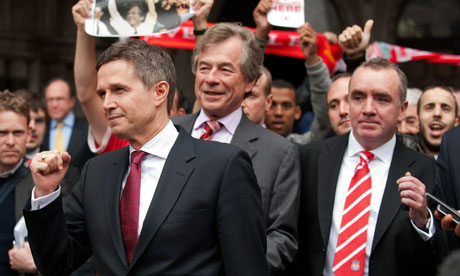
So, in relaxed, celebratory mood a year on from the court battle which ousted Tom Hicks and George Gillett from Liverpool and installed new Americans, Fenway Sports Group, as the club's owners, the managing director, Ian Ayre, mused out loud about breaking up the Premier League TV deal. That is the one element of clubs' income which they share; everything else, the tickets (prices raised to £45 this season to sit on the Kop), replica shirts at £40, advertising and sponsorship, the clubs all keep to themselves.
The Premier League, of course, was itself formed as a breakaway in 1992, by Liverpool and the other First Division clubs, from having to share the forthcoming satellite TV millions with the clubs in the other three divisions of the Football League. In its 20th season, the Premier League has managed to keep its own TV‑sharing formula intact, the one mechanism which operates to at least give the Boltons a chance of not embarrassing themselves at Old Trafford, even if all clubs outside four, at most, have no chance of expecting to challenge for the title.
The domestic TV deal – the £2.1bn from 2010‑13 which Rupert Murdoch's BSkyB and ESPN pay for the live pay-TV stranglehold, and the BBC for bite-sized highlights – is shared 50% equally, 25% according to where a club finishes in the table, and 25% to clubs every time they are on live. It favours the big clubs, but not mountainously; Manchester United were paid £42.4m last season, while Blackpool, who received the lowest, made exactly half that, £21.2m.
Overseas rights have always been shared equally, and while in 1992 they were almost nonexistent, the current deal, reflecting the game's global popularity, especially in the Middle and Far East, is worth £1.4bn over the next three years. So last season Blackpool received the same as United: £17.9m.
It was only a matter of time before the big clubs would start to challenge this last vestige of sharing, as they did in the 1980s, removing, with the threat of the breakaway they ultimately did anyway, the sharing of gate receipts which had been core to the Football League's competition since it was founded in 1888.
It is a bitter pill, but not that surprising, that the club which has articulated this appetite is one of the four major clubs owned by American buyers. All of them own sports franchises in the US, where their sports operate very strict systems of sharing money, including ticket money, merchandising, TV rights, in fact all revenues. In Major League Baseball, in which Fenway owns the Boston Red Sox, gross revenues are taxed and shared quite equally – although the details are not publicly disclosed – and there is a draft system, specifically designed to ensure that the Red Sox, New York Yankees and other major teams do not relentlessly dominate and the competitions become predictable.
The American buyers for Liverpool, Arsenal and Manchester United in particular have been attracted into a sport which, unlike their own, now has a global following on television and the internet, from which they believe they can ultimately make a great deal of money. The Premier League also allows them to keep so much more of the money they make than US sports do, as financial dominance here does concentrate sporting success in the trophy cabinets of fewer clubs.
In 19 years only Blackburn Rovers, once, through its momentarily greater spending power, Arsenal three times, and Chelsea via an oligarch's fortune, have interrupted the dominance of United, the highest-earning club throughout, despite the debts loaded on by the Glazer takeover. A football story like Brian Clough's Nottingham Forest miracle, winning the league in their first season promoted in 1978 then the European Cup twice, is now impossible, because financial inequality buys too great a sporting inequality. Manchester City's move from ninth in the Premier League in 2008 to third last season was achieved after the spending of £600m by Sheikh Mansour of Abu Dhabi – it takes one of the world's richest men, not an inspirational football manager alone, to break into English football's elite.
Yet still, with no gate sharing, which helped level competition as the Football League grew into a storyboard of great clubs, or of other revenues, Ayre says Liverpool want more. The Premier League was born from an impulse of individual greed against the collective – unlike US sports – and that appetite has only grown, not lessened, in the 20th year of the English game's new era, with the last vestiges of sharing under renewed attack.

